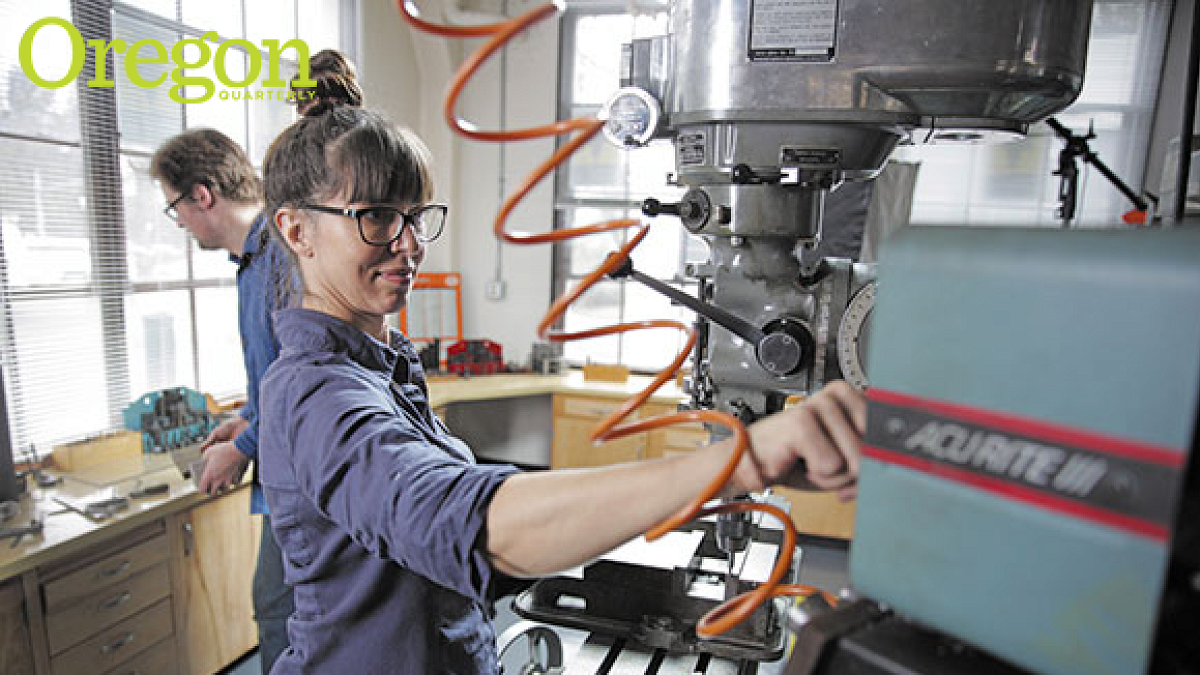John Boosinger remembers the day in 1999 when he first set foot in the UO’s machine shop near Lawrence Hall. As an architecture student, he had often peered through the shop windows, fascinated by the lathes, mills, and drills. That day, he was riding by on his unicycle.
One of the machinists ran out and called after him. He needed some help, and happened to be working on a unicycle. Boosinger was happy to lend a hand—a gesture that led to a part-time job, an entry-level position, and eventually his current role as director of the UO’s Technical Sciences Administration (TSA), the team that runs the shop and works on high-precision projects for the UO’s science labs.
Today, Boosinger hopes to welcome more first-timers into the shop, thanks to a new maker space (a community center with tools for making things) and classroom he opened this fall. The plan, he says, is to create a welcoming workshop where students, faculty, and staff members can learn the basics of metal fabrication, get their hands dirty, and make things. Members of his staff will consult with clients on their projects and, when necessary, tackle the more technical aspects of turning ideas on paper into functional objects.
“If any student has ever had a vision, invention, or kick-starter project—something that is in their mind right now and they want to find out if it can become a reality and hold it in their hands—I feel like our shop is a good resource to start,” says Boosinger. “You can walk in the door and I’m ready to help make that vision become a reality. I have met very few students who didn’t get excited about that moment, realizing that this block of material can be cut in half. It can be worked. Hands-on education is so much quicker and more effective than trying to look through a book on how things are built.”
The UO is at the forefront of a national maker space movement, especially when it comes to a collaborative, interdisciplinary approach where each shop isn’t dedicated to just one department, says Boosinger. His design and innovation shop is one of six maker spaces on campus. Offering an array of high- and low-tech tools, the spaces give students powerful new ways to design prototypes, try out ideas, and make things that enhance their university experience, regardless of their majors or educational goals.
The DeArmond MakerSpace in the new Allan Price Science Commons and Research Library, for instance, has a laser cutter, 3-D printer, drill press, and sewing machine. The EMU’s craft center offers tools for woodworking, pottery, glass-working, and more. Boosinger’s shop specializes in high-end metal fabrication—just what the UO needs right now, he says.
Interdisciplinary, entrepreneurial programs such as product design mean more students making prototypes of their creative ideas. Demand will increase in coming years as the $1 billion Phil and Penny Knight Campus for Accelerating Scientific Impact takes shape. The Knight Campus is designed to speed up the cycle of generating impact from discoveries.
Boosinger’s team brings years of practical experience, solving problems and developing projects that function in rigorous laboratory conditions. Though his team has focused on the UO’s science labs in the past, its portfolio has expanded beyond the sciences in recent years.
“It’s never the same,” he says. “Science is always changing. The projects are always changing. Any day, every day, a student or professor will walk in with a new problem. I’m nowhere near done learning, which is a great joy.”
The thousands of projects developed in the shop include a 500-gallon tsunami simulator, alloy sample chambers that replicate the 2,000-degree temperature and 50,000 pounds-per-square-inch pressure of a volcano’s molten core, and an atom-trapping tunable diode laser.
For the Department of Product Design, Boosinger’s team created aluminum molds for a 500-ton steam press. They helped a faculty artist bring her 5,000-LED light installation to life and developed an innovative camera mount for the School of Journalism and Communication. Faculty members in the Charles H. Lundquist College of Business commissioned smartphone replicas for a marketing research project.
Boosinger’s shop is the only place on campus that can fabricate metal—with precision down to .0001 inches. His staff offers expertise in mathematics, physics, electrical engineering, 3-D computer modeling, and machinery. They have tools you won’t find anywhere else on campus, like a specialized contraption called a five-axis CNC mill.
“A small 3-D printer will create an excellent model of that robotic guide dog you’re creating for your product design class. But this is where you come when you’re ready to make a working prototype. You need a fully functional robot. It could be done here. That’s kind of an extreme example. But we could actually make it.”
The Design and Innovation Shop (also called the Scientific Instrument Fabrication and Engineering Shop) is located in 101 Cascade Annex, and is available to all UO students and faculty and staff members at an hourly rate of $15. The shop also offers prototype and design and manufacturing services at an hourly rate of $50 for on campus work and $100 for off campus business. Consultations are free.
—By Ed Dorsch, University Communications


